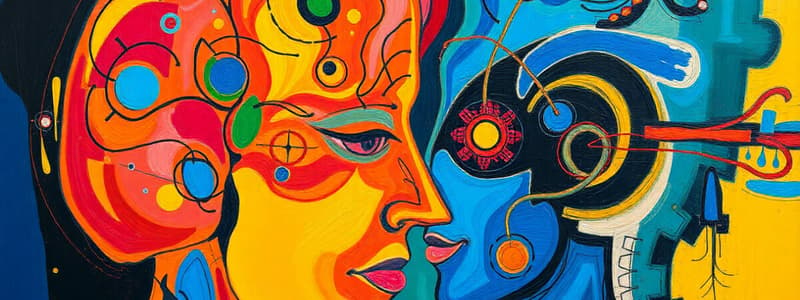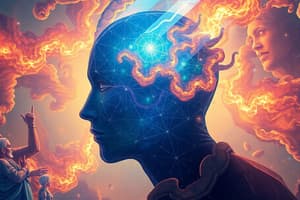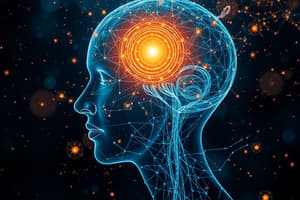Podcast
Questions and Answers
What limitation is suggested regarding the phenomenology of other species?
What limitation is suggested regarding the phenomenology of other species?
- Animals experience consciousness in the same way as humans.
- Qualia can be fully explained through scientific methods.
- We can have similar experiences to other species through imitation.
- It is impossible to fully understand another species' experiences. (correct)
According to Dennett, what aspect of consciousness is open to scientific study?
According to Dennett, what aspect of consciousness is open to scientific study?
- The philosophical implications of qualia.
- The inherent subjective experiences of the self.
- The neural correlates of visual consciousness. (correct)
- The emotional responses of animals.
What happens primarily with bodily self-processing according to the content provided?
What happens primarily with bodily self-processing according to the content provided?
- It is controlled by external stimuli exclusively.
- It is usually automatic and subconscious. (correct)
- It only occurs when one is fully aware of their surroundings.
- It always requires conscious effort to perceive.
What is mentioned as an area of scientific study that relates to consciousness?
What is mentioned as an area of scientific study that relates to consciousness?
What hypothesis is suggested regarding predictions about mental states?
What hypothesis is suggested regarding predictions about mental states?
What term did David Chalmers use to describe the challenge of explaining how physical processes lead to subjective experiences?
What term did David Chalmers use to describe the challenge of explaining how physical processes lead to subjective experiences?
Which of the following is NOT classified as an 'easy problem' of consciousness according to Chalmers?
Which of the following is NOT classified as an 'easy problem' of consciousness according to Chalmers?
What does the term 'conscious' imply when contrasted with 'unconscious'?
What does the term 'conscious' imply when contrasted with 'unconscious'?
Which philosopher questioned the difficulty of the hard problem in understanding consciousness?
Which philosopher questioned the difficulty of the hard problem in understanding consciousness?
What aspect of consciousness relates most directly to personal subjective experience?
What aspect of consciousness relates most directly to personal subjective experience?
What is the process by which conscious content can be described?
What is the process by which conscious content can be described?
Which of the following states of consciousness is characterized by non-communication despite sleep-wake cycles?
Which of the following states of consciousness is characterized by non-communication despite sleep-wake cycles?
Which method focuses on comparing different states of consciousness?
Which method focuses on comparing different states of consciousness?
What does conscious processing involve according to the definitions provided?
What does conscious processing involve according to the definitions provided?
Which condition is characterized by paralysis while maintaining cognitive function?
Which condition is characterized by paralysis while maintaining cognitive function?
What is the main focus of modern neuronal theories of consciousness?
What is the main focus of modern neuronal theories of consciousness?
Which mechanism is crucial for creating integrated representations of conscious experiences?
Which mechanism is crucial for creating integrated representations of conscious experiences?
According to modern theories, consciousness can be considered as which of the following?
According to modern theories, consciousness can be considered as which of the following?
Which theory emphasizes the importance of a dynamic core in consciousness?
Which theory emphasizes the importance of a dynamic core in consciousness?
What does re-entrant processing imply in the context of consciousness?
What does re-entrant processing imply in the context of consciousness?
Flashcards
The Hard Problem of Consciousness
The Hard Problem of Consciousness
Describes the challenge of understanding how physical processes in the brain lead to our subjective experiences, like feeling pain or seeing colors.
Mind-Body Problem
Mind-Body Problem
Refers to the difficulty of explaining how a physical entity (the brain) produces a non-physical phenomenon (consciousness).
Easy Problems of Consciousness
Easy Problems of Consciousness
The ability to discriminate, categorize, and react to stimuli, integrate information, report mental states, focus attention, access internal states, and control behavior.
What is it like to be a bat?
What is it like to be a bat?
Signup and view all the flashcards
Consciousness as 'Aware'
Consciousness as 'Aware'
Signup and view all the flashcards
Consciousness
Consciousness
Signup and view all the flashcards
Conscious content
Conscious content
Signup and view all the flashcards
Conscious access
Conscious access
Signup and view all the flashcards
States of consciousness
States of consciousness
Signup and view all the flashcards
Conscious processing
Conscious processing
Signup and view all the flashcards
Phenomenology
Phenomenology
Signup and view all the flashcards
Qualia
Qualia
Signup and view all the flashcards
Dennett's View on Consciousness
Dennett's View on Consciousness
Signup and view all the flashcards
First-Person Subjectivity
First-Person Subjectivity
Signup and view all the flashcards
Bodily Self-Processing
Bodily Self-Processing
Signup and view all the flashcards
Neuronal Global Workspace Theory
Neuronal Global Workspace Theory
Signup and view all the flashcards
Consciousness as distributed
Consciousness as distributed
Signup and view all the flashcards
Re-entrant processing
Re-entrant processing
Signup and view all the flashcards
Thalamic dynamic core theory
Thalamic dynamic core theory
Signup and view all the flashcards
Entailment view of consciousness
Entailment view of consciousness
Signup and view all the flashcards
Study Notes
Consciousness
- Consciousness is the most perplexing problem in the science of the mind.
- There's no universally accepted definition in science or philosophy, despite many attempts.
- The word "consciousness" is used differently in everyday language. It can refer to being awake/responsive, or being aware of something, or even a subjective personal experience.
The Hard Problem of Consciousness
- Chalmers coined the phrase "the hard problem of consciousness" (1995).
- "Easy problems" are cognitive functions which can be explained by cognitive models or neuroscience.
- Subjective experiences (the hard problem) accompany these cognitive functions.
- The hard problem is also known as the mind-body problem.
- It asks how physical processes give rise to subjective experience, and how the mind interacts with the physical body.
- Chalmers describes easy problems in relation to consciousness.
The Mind-Body Problem
- The mind-body problem seeks to explain how physical processes result in mental ones, and how they interact.
- Leibniz (1714) argued that machines could not explain perception, due to it being fundamentally different to mechanism.
- Nagel (1974) posed the question "what is it like to be a bat?".
Defining Consciousness
- Dehaene et al. (2014) offer several possible aspects:
- Conscious content: what one is aware of at a specific moment
- Conscious access: processes of becoming conscious of content
- Conscious processing: operations applicable to conscious contents
- Conscious report: process of describing contents
- States of consciousness: ability to entertain a stream of contents.
Measuring Consciousness
- Modern approaches aim to identify neural correlates of consciousness (NCCs).
- Various states of consciousness are compared: e.g. asleep vs. awake; anesthetized vs. awake, cases with disorders of consciousness.
- Tools like Coma recovery scale and Glasgow coma scale help assess consciousness levels.
- Vegetative state: wake-sleep cycle (eyes open and some motor activity, eyes closed and sleep); reflexes, but no communication.
- Minimally conscious state: some responsiveness and communication.
Neural Correlates of Consciousness
- Global Workspace Theory (Dehaene, 2006): conscious states depend on global availability of information.
- Neural Darwinism (Edelman): neural structures firing in synchrony, forming the basis of brain function.
- Long-distance connections and synchronised neuronal activity are key to consciousness.
- Thalamo-cortical loops are crucial for integrating sensory input and sub-cortical activity.
Cognitive Processes Associated with Consciousness
- Re-entrant processing: feedback projections are important in consciousness, as well as prediction and comparison of input.
- Integrated and differentiated neural activity are significant for consciousness: integrated neural activity shows synchronicity across regions. Differentiated neural activity expresses complexity.
Neurological Disorders and Consciousness
- Individuals with disorders of consciousness demonstrate differences in cognitive processes and brain activity.
- Information sharing in the brain influences consciousness, particularly in centroposterior regions.
- Perturbation studies, like TMS and EEG, help to identify neural correlates. These neuroimaging technologies can assess consciousness by detecting information sharing.
- PCI, a complex indicator of consciousness, is measured reliably on individuals.
What We Know About Consciousness
- Defining consciousness remains a difficult task, although several approaches provide insights into its neural correlates.
- There is a need for correlational and causal studies for better understanding conscious experience.
Studying That Suits You
Use AI to generate personalized quizzes and flashcards to suit your learning preferences.




